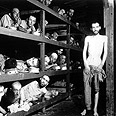
Archives
Photo: AP
A few days ago, a poll found that two-thirds of the Dutch people are opposed to their prime minister apologizing to the Jewish community for the misconduct of the wartime government in exile in London. Only 27% of those polled were in favor of such apologies.
Dutch governments have consistently ignored requests to fully admit the extent of the involvement of the Dutch in the persecution of Jews during the Second World War. Even in recent days, some Dutch historians tried to inflate beyond proportion the importance of a few general remarks on this issue by the current Dutch Queen Beatrix in March 1995 in the Knesset.
She said that there were many Dutch who had resisted the Germans, but they were the exceptions and that “the people of the Netherlands could not prevent the destruction of their Jewish fellow citizens.” Later that year, on National Memorial Day, she added: “Thinking about the Holocaust should fill us with shame.”
This pales in comparison to what French President Jacques Chirac said a few months later: “France committed the irremediable. It broke its word and delivered those it protected to their executioners. We maintain toward them an unforgiveable debt.” Two years later, Socialist Prime Minister Lionel Jospin was even more explicit and said, “Not even one German soldier was necessary to carry out this disgrace.”
Afterwards, the Netherlands fell behind in its apologies compared to other countries. When then-Prime Minister Jan Peter Balkenende came to Israel in 2005 for the opening of Yad Vashem Museum, I raised the issue of apologies in a short conversation. Balkenende asked me for a letter on this issue. I only received a formal acknowledgement from his staff for it.
At the same opening, Belgian Prime Minister Guy Verhofstadt repeated his apologies for the collaboration of Belgians which he had already expressed in 2002.
On that occasion, Balkenende only said that “the deportation of most of Dutch Jewry was a pitch-black chapter in Dutch history and that coldness and indifference toward the Jews had been dominant.” A month later, he admitted that Dutch authorities had collaborated with the occupiers. The emphasis of his words was more on those who took risks for other people than on the many Dutch traitors.
More international exposure?
Several Dutch historians claim that wartime history is an issue for historians. None of them explained why they haven’t asked for government apologies to the Jewish community for 65 years.
The Dutch apologies issue was raised last week publicly due to statements of former Deputy Prime Ministers Els Borst and Gerrit Zalm in my recent book, Judging the Netherlands: The Holocaust Restitution Process 1997-2000. After the Dutch daily DePers published their quotes on January 4th, Geert Wilders, leader of the Freedom Party, requested that Prime Minister Mark Rutte apologize to the Jewish community.
What happens if the Dutch government follows majority opinion and doesn’t apologize? Most likely, this will lead to more international exposure of Dutch misconduct in many areas. This will include the Dutch government in London taking a year and a half to inquire about the fate of deported Dutch Jews from the Polish government, which sat in the same building. Or how in 1943 Henri Dentz, a Dutch official in London, could not find anyone in the government or even at the Red Cross to read his report, which revealed that 90% of deported Dutch Jews had been murdered.
Much attention will also be focused on Dutch Queen Wilhelmina, who regularly spoke to the Dutch people from London via radio for four years. Only three times during that period did she devote attention to the Jews: Five sentences in total. Before the war, she opposed the establishment of a center for German Jewish refugees in a location that she considered too close to her palace. The distance was 12 kilometers.
Another issue to mention again is Dutch postwar misconduct during the restitution process. Prime Minister Kok, under pressure, apologized for this in 2000, but added that except for one case, this wrongdoing was not intentional. There are, however, many more examples of bad postwar intentions toward the Jews.
A very different type of potential exposure concerns the never properly investigated Dutch war crimes during “police actions” in Indonesia in the late 1940s. More than 100,000 people were killed. The Dutch government has recently apologized to the inhabitants of one village, Rawagede, where all native males were executed without a trial. There are however, several similar cases about which little is known.
Current Prime Minister Rutte would be well advised to consider all of this when he decides whether to apologize or not.
Dr. Manfred Gerstenfeld has published 20 books. Several of these address anti-Semitism and anti-Israelism















